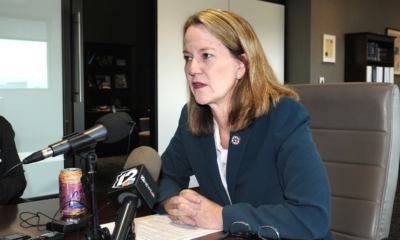Appropriation Committee
House Appropriations Greenlights Proposition 123, Opening Doors for Future Teacher Pay Raises

House Appropriations recently advanced a new set of measures concerning Proposition 123, signaling a renewed focus on education funding. School choice protections and potential charter school deregulation are anticipated as amendments in upcoming discussions.
The committee’s version of Proposition 123 aims to maintain the current distribution rate for a decade and allocate funds for teacher pay raises. Measures proposed by lawmakers were discussed, highlighting possible amendments related to charter school regulations and the Empowerment Scholarship Account program.
This unexpected movement on Proposition 123 comes as the legislature shifts attention back from budget discussions. With recent approvals for the House budget and ongoing work in the Senate, lawmakers appear eager to push the education initiative forward.
Rep. Matt Gress, who has been a key figure in the Proposition 123 discussions, was absent during this committee meeting. Instead, Rep. David Livingston took the lead as two new measures gained approval through “strike-everything” amendments.
The proposed House Concurrent Resolutions 2031 and 2058 aim to secure a 6.9% distribution rate for the next ten years, focusing support on teachers dedicated to classroom instruction. This proposition is set to be voted on in the general election of 2026.
During the discussions, questions arose regarding potential deregulation for charter schools. Although the current proposal lacks these provisions, Livingston suggested that amendments may emerge in future deliberations.
Despite advancements, many education stakeholders voice their opposition. Rebecca Bebee from the Arizona School Administrators Association criticized the proposal’s narrow definition of a teacher, which could restrict schools’ autonomy in managing their staff.
Marisol Garcia, president of the Arizona Education Association, emphasized opposition to linking pay increases to evaluations, expressing concern about the potential misalignment between salary raises and performance-based assessment.
There is also notable discontent regarding the lack of support for education support personnel. As the resolutions faced a vote, Republican lawmakers demonstrated mixed levels of approval.
Rep. Walt Blackman expressed strong reservations about any provisions favoring charter school deregulation. He highlighted concerns over the rights of students with disabilities and the broader implications for rural communities.
Throughout the discussions, Democratic representatives voiced their worries over potential deregulation and impacts on public education funding. Rep. Nancy Gutierrez articulated skepticism regarding the current proposal’s viability for a vote.
As the discussion penetrated deeper, Rep. Livingston, although voting yes, still expressed a commitment to enhancing parental and school choice in rural districts, pointing toward a future where charter and private educational options could expand.
Despite successfully navigating a committee hurdle, the overall Proposition 123 plan still faces significant obstacles. The Senate has yet to release an updated resolution as Sen. J.D. Mesnard leads the Republican effort to refine the proposal further.
Mesnard has indicated that the latest proposition would aim for a 6.9% distribution rate, contemplating a structure where 4.5% remains permanent and 2.4% would lapse after ten years. Teachers could potentially receive a pay raise of around $4,000, contingent upon their classroom time and performance evaluations.


















